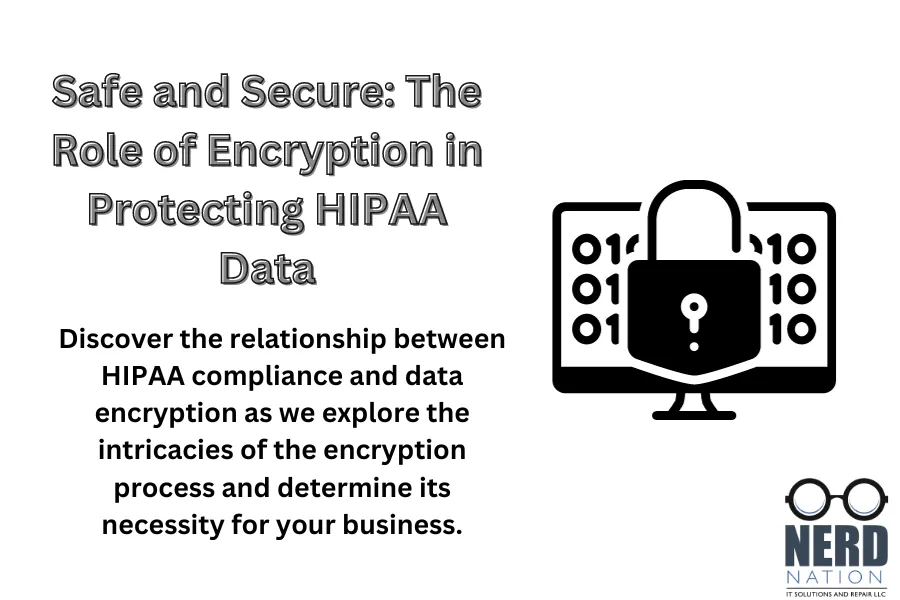Blog
Business IT articles and News

Safe and Secure: The Role of Encryption in Protecting HIPAA Data
Safe and Secure: The Role of Encryption in Protecting HIPAA Data
Discover the relationship between HIPAA compliance and data encryption as we explore the intricacies of the encryption process and determine its necessity for your business.
Intro
HIPAA, the Health Insurance Portability and Accountability Act, is essential for protecting the confidential data of patients. To ensure that data is safeguarded, encryption is a key factor. Encryption is the process of encoding data so that it is unreadable to anyone without the key. It is a powerful tool for protecting data from unauthorized access, and it is an important component of HIPAA compliance. In this blog post, we will discuss the role of encryption in protecting data in accordance with HIPAA regulations.
Why Data Encryption Matters in HIPAA Compliance
Data encryption is a critical component of HIPAA compliance for ensuring the safety and security of patient data. With the increasing amount of sensitive information being stored electronically, it is essential to protect this data from unauthorized access. HIPAA regulations require healthcare organizations to implement measures to safeguard patient information, and encryption plays a crucial role in meeting these requirements.
Encryption works by encoding data in such a way that only authorized individuals with the proper key can decode and access it. By encrypting patient health information (PHI), healthcare organizations can significantly reduce the risk of data breaches and maintain the privacy of their patients. In the event of a security breach, encrypted data remains unreadable and useless to attackers without the encryption key.
Furthermore, data encryption is not only necessary for meeting HIPAA regulations, but it also helps to build trust and confidence with patients. Patients have the right to know that their personal health information is being protected, and implementing encryption measures is a proactive step in assuring them of this.
In summary, data encryption is a crucial aspect of HIPAA compliance as it helps to ensure the safety and security of patient information. Implementing encryption measures not only helps healthcare organizations meet regulatory requirements but also builds trust with patients by demonstrating a commitment to protecting their privacy.
Understanding the Basics of HIPAA Regulations
HIPAA, which stands for Health Insurance Portability and Accountability Act, is a set of regulations that were implemented to ensure the privacy and security of patients' confidential information. These regulations apply to all healthcare organizations and their business associates that handle protected health information (PHI).
HIPAA regulations set standards for the privacy and security of PHI, as well as for the electronic transmission of this data. They outline the rights of patients regarding their health information, including the right to access their records and the right to request amendments to incorrect or incomplete information.
In addition to privacy and security requirements, HIPAA also establishes guidelines for the use and disclosure of PHI. Healthcare organizations must have policies and procedures in place to ensure that PHI is only accessed or shared by authorized individuals for legitimate purposes.
Compliance with HIPAA regulations is essential to safeguard patients' privacy and protect their health information from unauthorized access. By understanding the basics of HIPAA regulations, healthcare organizations can ensure that they have the necessary measures in place to maintain the safety and security of patients' PHI.
How Encryption Helps Keep PHI Secure
In the world of healthcare, data security is paramount, especially when it comes to protecting sensitive patient information. This is where encryption comes into play. Encryption plays a crucial role in keeping PHI secure and complying with HIPAA regulations.
By encrypting patient health information, healthcare organizations are adding an extra layer of protection to safeguard the privacy and integrity of this data. Encryption works by transforming the data into an unreadable format, ensuring that even if it is intercepted by unauthorized individuals, it remains incomprehensible without the encryption key. This significantly reduces the risk of data breaches and ensures that only authorized personnel can access and decode the information.
Furthermore, encryption is not just a mandatory requirement for HIPAA compliance; it is a fundamental aspect of building trust and confidence with patients. Knowing that their personal health information is being encrypted and safeguarded gives patients peace of mind, knowing that their data is being treated with the utmost care and consideration for their privacy and safety.
In summary, encryption is an indispensable tool for keeping PHI secure. By implementing encryption measures, healthcare organizations can meet HIPAA regulations, reduce the risk of data breaches, and build trust with their patients.
Best Practices for Implementing Data Encryption
Implementing data encryption in accordance with HIPAA regulations requires healthcare organizations to follow best practices to ensure the safety and security of patient information. Here are some key best practices to consider when implementing data encryption:
1. Conduct a risk assessment: Before implementing data encryption, conduct a thorough risk assessment to identify potential vulnerabilities and determine the appropriate encryption methods and solutions for your organization.
2. Develop an encryption policy: Create a comprehensive encryption policy that outlines the specific encryption measures to be implemented and the responsibilities of staff members regarding encryption practices.
3. Use strong encryption algorithms: Utilize industry-standard encryption algorithms that provide robust security. This ensures that patient data remains protected from unauthorized access.
4. Secure encryption keys: Safeguard encryption keys by using strong passwords and encryption key management systems. Regularly update and rotate encryption keys to maintain data security.
5. Train employees on encryption practices: Educate and train employees on the importance of encryption and best practices for handling and encrypting sensitive patient information.
6. Regularly update encryption software: Keep encryption software up to date with the latest patches and security updates to address any vulnerabilities and ensure the effectiveness of the encryption measures.
By following these best practices, healthcare organizations can effectively implement data encryption to comply with HIPAA regulations and ensure the safety of patient information.
Common Pitfalls to Avoid When Using Encryption
When it comes to data encryption in HIPAA compliance, there are certain pitfalls that healthcare organizations need to be aware of to ensure the safety and security of patient information. One common pitfall is the failure to properly secure encryption keys. Encryption keys are essential for decoding encrypted data, so if they fall into the wrong hands or are not properly managed, the effectiveness of the encryption is compromised. Healthcare organizations should implement strong password protection for encryption keys and consider using encryption key management systems to securely store and rotate the keys regularly.
Another pitfall to avoid is neglecting to update encryption software. Just like any other software, encryption software may have vulnerabilities that need to be addressed through regular updates and security patches. Failing to keep the encryption software up to date can leave the system exposed to potential breaches.
Lastly, healthcare organizations should be cautious about relying solely on encryption to protect patient data. While encryption is an important security measure, it should be implemented in conjunction with other security measures, such as firewalls, access controls, and employee training. By avoiding these common pitfalls, healthcare organizations can effectively utilize encryption to protect patient information and maintain HIPAA compliance.
The Future of Data Encryption and HIPAA Compliance
As technology continues to advance, the future of data encryption and HIPAA compliance looks promising. With the increasing emphasis on patient privacy and data security, healthcare organizations will need to stay ahead of the curve to ensure the safety of sensitive information.
One area of development is the improvement of encryption algorithms. As hackers become more sophisticated, encryption methods will need to evolve to keep up with the ever-changing landscape of cybersecurity threats. This means that healthcare organizations must stay updated on the latest encryption standards and algorithms to ensure the effectiveness of their data protection measures.
Another aspect of the future of data encryption in HIPAA compliance is the integration of encryption into emerging technologies. As the healthcare industry adopts more digital solutions, such as telehealth and mobile health applications, it will be crucial to incorporate encryption into these platforms to protect patient data. Additionally, the use of cloud storage and computing will require robust encryption protocols to maintain HIPAA compliance and ensure data safety.
Furthermore, as regulatory bodies continue to strengthen data privacy laws, we can expect to see stricter enforcement of HIPAA regulations and potentially new requirements for encryption. Healthcare organizations must be proactive in staying informed about any changes to ensure ongoing compliance and the safety of patient data.
In summary, the future of data encryption and HIPAA compliance is driven by the need for increased safety and security in healthcare. Healthcare organizations must adapt to evolving encryption standards, integrate encryption into new technologies, and stay updated on regulatory changes to protect patient information effectively. By prioritizing data encryption, healthcare organizations can stay ahead of potential threats and maintain the highest level of patient privacy and data security.




